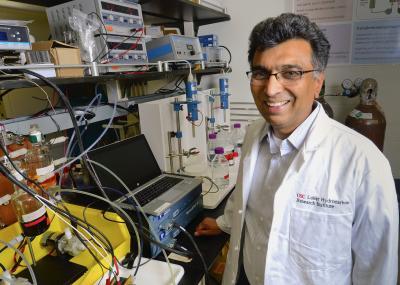When it comes to organic, the last thing you expect is cheap but a new battery may end up being just that.
USC researchers have developed a water-based organic battery that is long lasting and made from cheap, eco-friendly components. It used no metals or toxic materials and is intended for use in power plants. Power plants are not in the storage business, they are in the generation business, but if solar and wind power become viable we are going to need high-capacity storage to even out the ups and downs of Mother Nature.
"The batteries last for about 5,000 recharge cycles, giving them an estimated 15-year lifespan," said Sri Narayan, professor of chemistry at USC. "Lithium ion batteries degrade after around 1,000 cycles, and cost 10 times more to manufacture."

USC professor Sri Narayan. USC Photo / Gus Ruelas
"Such organic flow batteries will be game-changers for grid electrical energy storage in terms of simplicity, cost, reliability and sustainability," said Surya Prakash, professor of chemistry and director of the USC Loker Hydrocarbon Research Institute.
The batteries could pave the way for renewable energy sources to make up a greater share of the nation's energy generation. Solar panels can only generate power when the sun's shining, and wind turbines can only generate power when the wind blows. That inherent unreliability makes it difficult for power companies to rely on them to meet customer demand.
With batteries to store surplus energy and then dole it out as needed, that sporadic unreliability could cease to be such an issue.
"'Mega-scale' energy storage is a critical problem in the future of the renewable energy, requiring inexpensive and eco-friendly solutions," Narayan said.
The new battery is based on a redox flow design – similar in design to a fuel cell, with two tanks of electroactive materials dissolved in water. The solutions are pumped into a cell containing a membrane between the two fluids with electrodes on either side, releasing energy.
The design has the advantage of decoupling power from energy. The tanks of electroactive materials can be made as large as needed – increasing total amount of energy the system can store – or the central cell can be tweaked to release that energy faster or slower, altering the amount of power (energy released over time) that the system can generate.
The team's breakthrough centered around the electroactive materials. While previous battery designs have used metals or toxic chemicals, Narayan and Prakash wanted to find an organic compound that could be dissolved in water. Such a system would create a minimal impact on the environment, and would likely be cheap, they figured.
Through a combination of molecule design and trial-and-error, they found that certain naturally occurring quinones – oxidized organic compounds – fit the bill. Quinones are found in plants, fungi, bacteria, and some animals, and are involved in photosynthesis and cellular respiration.
"These are the types of molecules that nature uses for energy transfer," Narayan said.
Currently, the quinones needed for the batteries are manufactured from naturally occurring hydrocarbons. In the future, the potential exists to derive them from carbon dioxide, Narayan said.
The team has filed several patents in regards to design of the battery, and next plans to build a larger scale version.
Source: University of Southern California